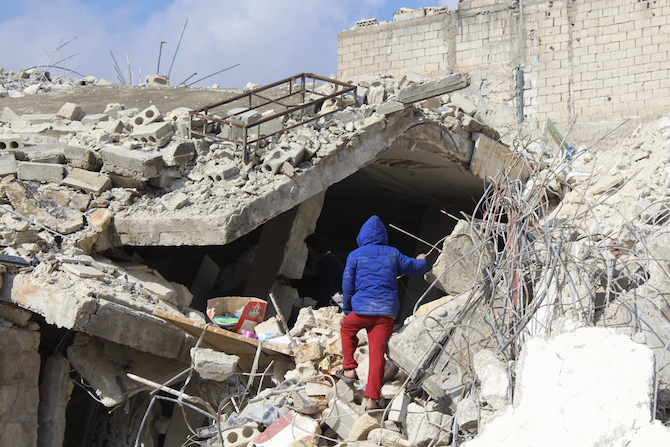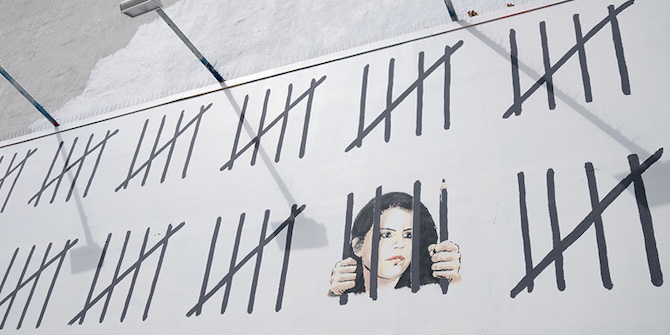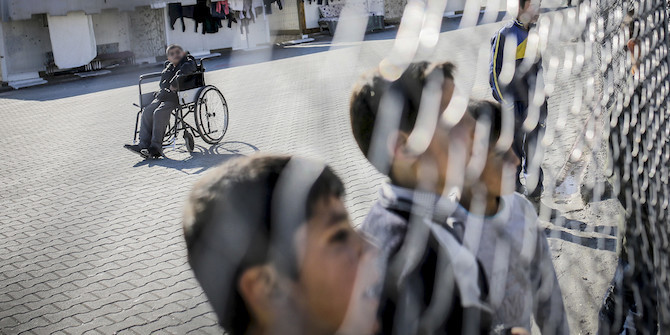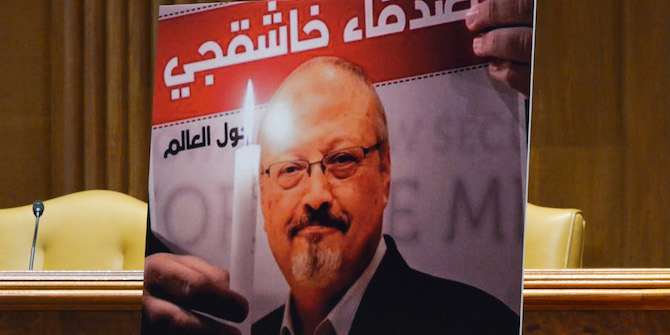Nesrin Alrefaai & Ammar Azzouz

Academia has been largely silent in response to the devastating earthquake that hit Syria and Turkey in the early hours of Monday 6 February 2023. Little has been done on an institutional level to support staff members and students who have been affected by the disaster and have families and friends struggling with the aftermath. Only a small number of universities have published statements of solidarity and condolence. This silence has led to criticism that universities are only offering a very selective sense of solidarity to suffering communities. Amidst intensive promotion of inclusivity and diversity in western universities, their silence on Syria and Turkey has prompted questions about whose inclusivity and diversity really matters.
Despite the lack of institutional support, academics around the world are reaching out to their colleagues to stand in solidarity and offer their help. We acknowledge that many people are feeling powerless in the face of such a catastrophic disaster. But we hope that this short piece will offer some tangible steps for creating spaces of solidarity with people in Syria and Turkey, and friends, where all levels of thoughtfulness and support can make a difference.
Reach Out to Students and Staff in Your Institutions
Many academics, researchers and students from Syria and Turkey are grieving alone, far away from home, and with very limited support. Their universities urgently need to provide the right infrastructure of resources to support them through the enormous psychological and practical effect on their lives. This should include a mixture of resources from university counselling services, and making academic material available to academics in Syria and Turkey. The psychological support available from universities should not only be narrowly offered to students and staff, but to fellow scholars suffering from trauma in the affected countries, as well as their families and children. This would be a significant undertaking, but it is one that was willingly and compassionately offered to scholars in Ukraine. If we are truly a global academic community, we must use our power, status, and resources to offer help wherever it is needed.
Ask Your University to Issue a Statement of Solidarity and Comprehensive Support Package
People in Syria and Turkey want to know that their pain matters, that the world stands in solidarity with them, and that their injury is visible and acknowledged. Academics around the world have been publicly asking their universities to issue statements of solidarity, sometimes making comparisons with how quickly their institutions issued statements in support of Ukraine. A lack of public solidarity risks signalling that certain lives matter more than others. At the time of writing only a few universities had reportedly issued letters of support, including the University of Essex, the University of Bordeaux and the University of Northampton. Together with your colleagues, ask your university to make a statement of support, and request the inclusion of concrete steps that the university will take to support the Syrian and Turkish academic community. Several universities offered comprehensive support packages to Ukrainian communities, including the University of Cambridge and the University of Edinburgh, as well as national schemes such as the UK-Ukraine twinning grants scheme, which provided the opportunity to grow supportive ties intended to last through and beyond the immediate crisis. This kind of approach must extend as equally as possible to our global academic community when it is affected by war, natural disaster, or any other kind of event that threatens the lives and livelihoods of our colleagues and friends.
Raise Funding
University communities can organise fundraising campaigns to support affected communities. However, it is very important to seek and follow available advice about where to donate. This is especially true of Syria, where the political context surrounding international aid has been complicated by 12 years of war. For international aid to enter the country, the Bab al-Hawa border crossing into Syria from Turkey is the point of entry. It took the UN Security Council seven days to negotiate with the Syrian regime to be allowed two more crossing points. The Syria (Sanctions) (EU Exit) Regulations 2019 came fully into force on 31 December 2020. They are intended to ensure that sanctions continue to operate effectively, and designated persons are included on the UK sanctions list. It is important to ensure that any fundraising goes to organisations who can get help to the affected areas legally. The Syrian British Consortium has put a list of organisations to donate to. A particularly effective way to donate is via the Disasters Emergency Committee, who have launched an appeal for donations, which the UK Government has said it will match, up to £5 million.
Fundraising efforts are also complicated by the claim that sending aid to government-controlled areas normalises relationships with the Syrian regime; something that many countries are seeking to avoid. However, natural disasters do not respect the borders and political concerns created by people, and it is vital that the aid effort prioritises humanitarian intervention.
On 13 February 2023, the Knowledge, Power, Politics research group at the University of Cambridge, in collaboration with other universities, hosted an event in solidarity with academics in Syria and Turkey, where it was noted that the most urgently needed response is financial support. The Council for At-Risk Academics (CARA), has launched an appeal and called for donations to support Syrian and Turkish academics, and their families, who are in need of swift help. The University of Edinburgh has also launched an appeal for donations, as has the University of Reading. You can donate to these appeals, and ask your university to launch a similar campaign.
Use Your Pens, Privilege and Power
Academics have privilege and power, which they can use to influence policy and shape political decisions. This privilege and power must now be put to good use, by making every possible effort to support communities affected by the earthquake. Write a letter to your local MP, jointly with your academic colleagues, stating that you want them to take action. Make specific demands. So far, the UK government has provided £8 million in immediate assistance, and £3.8 million to the Syrian White Helmets. A much greater sum is needed, with the World Health Organisation estimating that at least 23 million people are in need of aid. You can also ask your MP to lobby Parliament in making maximum use of the humanitarian exemptions allowed under the rules on sanctions, and to increase support at a local level for Syrian and Turkish communities in the UK.
Use Your Available Platforms to Spread Awareness
You can raise awareness about the earthquake’s many devastating impacts by bringing the voices of people directly affected to the forefront of people’s minds, through the platforms you have access to within your universities, across social media, and relevant publications. Amplify the voices of people directly affected by the disaster. Give them a space to tell their stories, express their pain, and communicate what they need.
Do Not Surrender to Despair – And Apathy
Now is a time for mourning, and deep grief. At the time of writing, over 38,000 people have been killed, and the numbers are expected to rise still further. But we cannot surrender into despair. If you are feeling small, and helpless, think of others, think of every small or big act of kindness, solidarity, support or care, words, voice, pressure, practical aid and support all matter. Every type of help matters. No single person can respond to this alone. We need spaces of collective solidarity: not only short-term crisis responses, but spaces which move beyond the moment of shock, and help to move towards healing and recovery. Academia has powerful potential to create this space, and we have a responsibility to utilise it.
[To read more on this and everything Middle East, the LSE Middle East Centre Library is now open for browsing and borrowing for LSE students and staff. For more information, please visit the MEC Library page.]







Turks are one of the biggest foreign student groups at TU Vienna (if not the biggest). There are also many Turkish (and of Turkish heritage) employees.
Until after the 11th day of the earthquake, they haven’t published anything on this topic. Receiving many emails and comments (on Instagram, LinkedIn, Facebook,etc) about this on the frst few days, the university not only ignored them, they have also limited instantly comment sections on their social media. This is what we call an “organised discrimination”.
When the war in Ukraine begun, only in four days, they have published a solidarity statement, and put together the mechanism to provide scholarships and dormitories for students from Ukraine.
I am not saying why they did all this for Ukrainian students. I am saying why they haven’t for us? That’s not whataboutism. They have delibaretely ignored our attempts to remind them that they have many Turkish students, and after a disaster this big, there isn’t a single person from Turkey who were directly or indirectly affected by this. NOT A SINGLE PERSON. Even if one is not from that region, we still have relatives and friends living there.
On the 11th day, they have published a hasty statement, but realising their hypocrisy, they have completely turned of comment section under that post out of fear.
I have never felt this worthless.